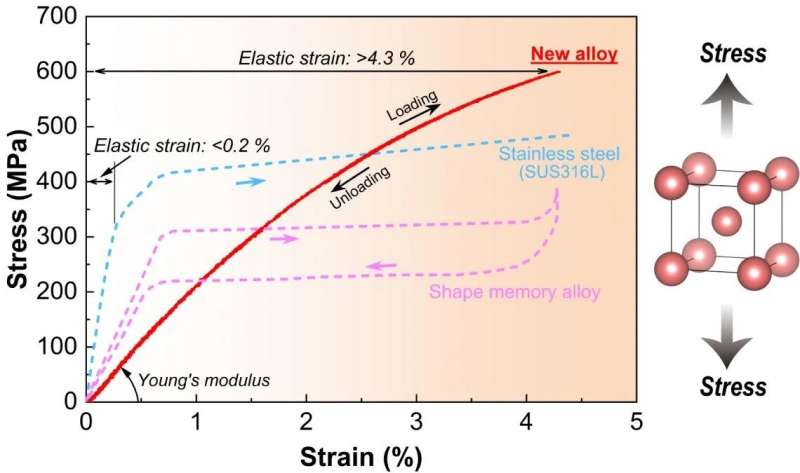New bulk metal alloy shows a large elastic limiting strain greater than 4.3%

A research group has developed a bulk copper-based alloy boasting the largest tensile elastic strain at room temperature to date.
Even when subjected to certain levels of stress, metals can spring back to their original shape due to elasticity. Materials with large elastic deformation provide greater flexibility in everyday sporting goods and medical devices, and are thus highly sought after.
Theoretically, most metals and alloys can endure a strain value of about 10%; but this is when the metals are reduced to micro or nano scales. When these metals are in their bulk shape, as they are for most practical engineering applications, the elastic strain plunges to below 1%. Stainless steel, for example, has an elastic strain of
Led by Sheng Xu, specially appointed assistant professor at Tohoku University’s Graduate School of Engineering, the group developed a bulk copper-based alloy that demonstrated a tensile elastic strain of >4.3% at room temperature, thanks to the reversible lattice strain of the BCC single phase.
The elastic softening behavior exhibited by the material meant that the relationship between tensile stress and strain was not linear, meaning it did not follow traditional Hooke’s law behavior.
Hooke’s law is a theory of elasticity, generalizing that the elasticity of an object is proportional to the stress applied. To get a large elastic strain, a low Young’s modulus, essentially the number that reveals how easily a material can stretch and deform, and high strength is needed. But in conventional metallic materials, there is a trade-off between these properties.
Nevertheless, the new material uniquely displayed a low Young’s modulus of
Moreover, preparing the bulk single crystals of the alloy requires a cyclic heat treatment, a simple process that enables it to be mass produced.
“Our bulk alloy can be used as spring materials with high recoverability, and they could also be applied to devices that employ strain-mediated sensors, such as stretchable electronics,” says Xu. “The new alloy’s low Young’s modulus resembles human bones and therefore has the potential for use in medical applications.”
Details of the research were published in the journal Nature Communications on September 27, 2022.
Looking ahead, the research group hopes to conduct tests on the functional fatigue of large elastic deformations on the alloy, something fundamental for its practical applications. They are also collaborating with relevant industries to explore more application possibilities of the alloy.
Sheng Xu et al, Non-Hookean large elastic deformation in bulk crystalline metals, Nature Communications (2022). DOI: 10.1038/s41467-022-32930-9
Citation:
New bulk metal alloy shows a large elastic limiting strain greater than 4.3% (2022, November 28)
retrieved 28 November 2022
from https://techxplore.com/news/2022-11-bulk-metal-alloy-large-elastic.html
This document is subject to copyright. Apart from any fair dealing for the purpose of private study or research, no
part may be reproduced without the written permission. The content is provided for information purposes only.
For all the latest Technology News Click Here
For the latest news and updates, follow us on Google News.
